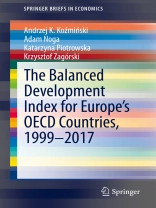This book presents the Balanced Development Index (BDI), measuring socioeconomic development in twenty-two European OECD member countries in a period 1999-2017. Compared to other composite measures of development, BDI looks beyond traditional development indicators, such as GDP, to create an index which gives equal weight to social, economic, objective, and subjective aspects of development. The BDI aggregates forty-two detailed indicators into four composite middle-level indexes: external economic (characterizing functioning of national economies in their international surroundings), internal economic (characterizing various aspects of domestic economic conditions), social expectations (public hopes and fears concerning economic, political and social conditions), and current social condition (including both objective and subjective social indicators)—which are, in turn, aggregated into the general BDI index.
Jadual kandungan
Chapter 1: Introduction.- Chapter 2: GDP Shortcomings and a Brief History of Creating General Measures of Socio-Economic Development.- Chapter 3: Conceptual and Theoretical Basis of Balanced Development Index (BDI).- Chapter 4: To Weight or Not to Weight?.- Chapter 5: Four Domains of Socio-Economic Development and their Indicators as BDI Components.- Chapter 6: International Differences in the Level and Pace of Socio-Economic Development.- Chapter 7: Chainges in BDI, its Four Components and GDP.- Chapter 8: BDI, Other Composite Measures of Socio-Economic Conditions and Happiness.- Chapter 9: Case Study: Poland.- Chapter 10: Emotional and Rational Countries.- Chapter 11: Development and Socio-Economic Balance.- Chapter 12: Conclusions.
Mengenai Pengarang
Andrzej K. Koźmiński, is a member of Polish Academy of Sciences, International Academy of Management, and European Academy. Professor Kozminski published extensively in the field of social sciences in Polish, English and French. His H Index is 27 and number of quotation exceeds 4, 600.
Adam Noga is a specialist in business cycles and enterprises, competition, accounting theories and macroeconomics. Currently, he lectures at Kozminski University in Warsaw. Professor Noga has received in 1994 the Prize of Bank Handlowy for his book ‘Domination and effective competition.’ In 2009, he has received an award for the best book on the enterprise ‘Theories of the firms” presenting his “theory of confirm.” In 2013, in the publication ‘The state as a leverage of household revenues, ‘ he has presented another original theory of a “constant state” in economy.
Katarzyna Piotrowska works at Kozminski University where she is a faculty member in Departments of Quantitative Methods and Information Technology. She teaches Statistics and Social Research Methodology. Amongst her main academic engagements and interests are the psychology of decision making – especially in the field of people’s reactions after making decisions, socio-economic development as well as economic attitudes and behaviour. She is also engaged in projects from other fields including management and medicine.
Krzysztof Zagórski teaches sociology and serves as a director of Empirical Sociology Center at Kozminski University, Warsaw. He has authored and co-authored about 150 publications (books, chapters and articles) devoted mainly to social stratification and mobility, public opinion and attitudes, social statistics and social indicators, economic and political sociology as well as living conditions and satisfactions. His current academic interests include socio-economic development, living conditions and economic attitudes.












